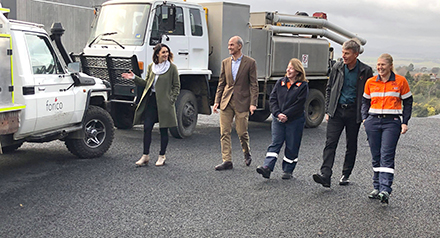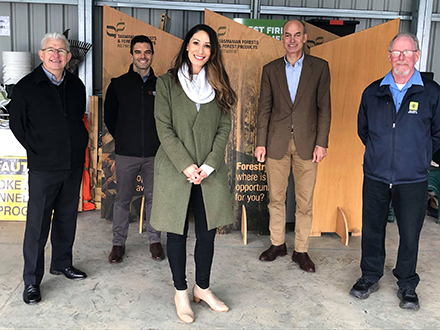
At Forico Launceston: Romany Brodribb (TFFPN), Minister Guy Barnett, Ray Mostogl (CEO TMMEC) and Bell Bay staff.
The Tasmanian Forests and Forest Products Network (TFFPN) will deliver a Diversity Action Plan for the forest industry which aims to increase the gender and cultural diversity of the workforce. Source: Timberbiz
The project was a key commitment in the Tasmanian Liberal Government’s First 100-day Plan and will provide $300,000 to the Network to develop and deliver an industry-driven Diversity Action Plan over the next two years that will attract more women and those from culturally and linguistically diverse backgrounds to the forest sector.
Network Convenor, Therese Taylor said industry is committed to broadening and bolstering its workforce with a range of skilled workers and that now is the right time to develop a whole-of-industry approach to improving diversity outcomes.
“It’s no secret the forest industry in Tasmania has historically been overwhelmingly male-dominated and not particularly culturally diverse – in fact, women currently comprise only 16% of the sector,” Ms Taylor said.
“But we also know that improved diversity outcomes are shown to increase productivity and improve culture in the workplace.
“We are thrilled that the Tasmanian Government is supporting the Network to develop and deliver this important piece of work, which will not only benefit those in the industry, but Tasmania more broadly through improved economic and social outcomes.”

Network Board Directors, Bryan Hayes, Brodie Frost and Tony Stonjek with Minister Guy Barnett and Romany Brodribb from the TFFPN.
Recent industry reports, including, ‘A Strategic Growth Plan for the Tasmanian forests, fine timber and wood fibre industry’ (2017), ‘Northern Tasmania Regional Forestry Hub: Culture, Training and Skills Assessment’ Report (2020), and the ‘Tasmanian Forest Industry Workforce Development Plan’ discussion paper (2021), have all highlighted the lack of workforce diversity as a significant issue affecting the future of forestry in the state—particularly in regional and remote areas.
“The evidence from these reports suggests that the industry across the different sectors is experiencing significant issues attracting a diversity of cohorts from the community—specifically women, young people, and recent migrants—to its workforce,” Ms Taylor said.
“The Diversity Action Plan project presents a considerable opportunity to develop a new, robust, skills-based forestry workforce that is more reflective of the broader community in which it is based.”







